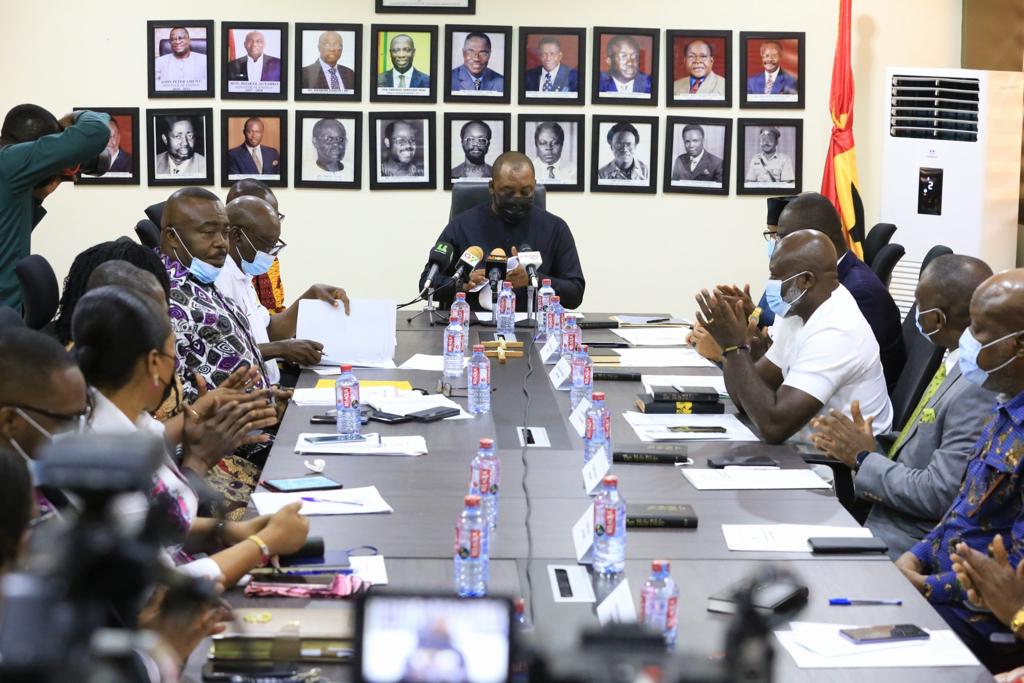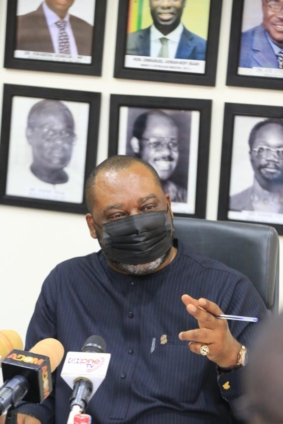Energy Minister, Dr Mathew Opoku Prempeh, says his outfit is seriously monitoring some staff of the Petroleum Commission, leaking sensitive information to players in the petroleum industry who in turn are using it against government.
Describing such conduct as unpatriotic and unacceptable, the Minister said there will be no hiding place for such individuals.
Inaugurating the Governing Board of the Commission responsible for regulation, management and utilisation of petroleum resources, the Minister charged them to critically examine the local content law and explore ways to allow Ghanaians to participate in the oil sector.
“If we all look at the gas and oil sector and we are not happy then it means the regulator is either not strong or is not asserting itself, but of more importance is the staff that work at the commission and those passing on confidential information to their friends. Instead of being patriotic, they are rather letting the country down. I hope that you [board] will look into it and the commission will find out what is going on”.
“Those who are leaking information and hurting government and the state, we are watching and you must know that there is no ‘sacred cow’ within the Petroleum Commission. Because when the whole of Ghana has decided to go a certain direction, nobody in the commission should feel so knowledgeable that they can outwit the board,” he warned.

Local content law
Ghana in 2013 passed the local content law that outlines strategies on how the government intends to develop the oil and gas industry with optimal local content and local participation by enhancing national development, creating jobs and effectively managing the potential revenue from oil and gas production and processing. This is in addition to ensuring security for oil and gas installations in the industry as a whole.
But years down the line, the participation of Ghanaians in the oil sector has been poor. This the Energy Minister wants a change.
“Some of us believe that Ghanaians must hold shares in the oil sector and even turn the tables; and that we should give our concessions to only Ghanaians and allow them to bring in partners so that Ghana can be seen to be benefiting from this resource. So those that are within our reach, we have to exercise direction but unfortunately, there are only a few Ghanaians that have monopolized the sector and it’s not good and therefore the board has a responsibility to ensure as many Ghanaians as possible benefit from the resources”, Dr Opoku Prempeh said
Chairman of the board, Stephen Sekyere Abankwa said his team will work with diligence and dedication to support government quest to increase the production of oil and gas.
Other members include the Second Deputy Speaker of Parliament Joe Osei Wusu, the Chief Executive Officer of the Environmental Protection Agency, Henry Kokofu and the CEO of the Petroleum Commission, Egbert Faibille.
Latest Stories
-
One month in and Bryan is making waves
7 minutes -
GhIE Branch 4 visits Legon and Ghana Airforce Engineering Departments
9 minutes -
Central Nairobi sealed off ahead of Kenyan protests
11 minutes -
7th Volta Trade & Investment Fair scheduled between 26th November and 8th December
13 minutes -
NLA Good Causes Foundation commissions 1 3-unit classroom block in Akanteng
28 minutes -
Impact Life Insurance introduces mobile-driven product to boost insurance access
28 minutes -
IMF Board to consider Ghana’s 4th programme review today July 7, 2025
36 minutes -
Police recruits urged to exhibit competence that matches public confidence
40 minutes -
IMF appoints Dr. Adrian Alter as new Resident Representative to Ghana
43 minutes -
Parliament introduces Monday and Saturday sittings to clear the backlog
54 minutes -
Africans must liberate themselves from foreign religions – Afrikania Mission
60 minutes -
Owners of escaped pet lion arrested after it attacks three people
1 hour -
PlayProvince’s Aura233 dominates Ghana qualifiers again — eyes on $1m Call of Duty World Championship
1 hour -
Esports Association Ghana launches first-ever National Esports League
1 hour -
Ghana’s 24H+ programme: Who’s leading, how it’s measured, and when it starts
2 hours

